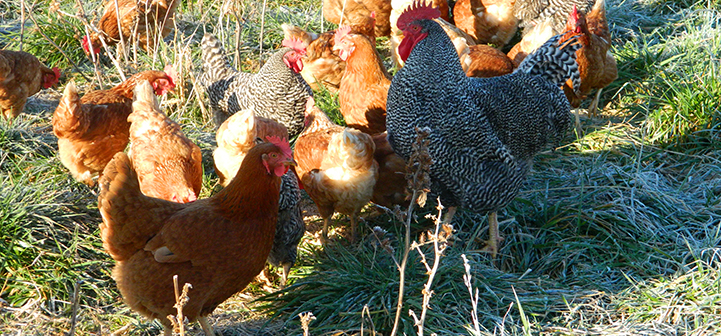Written by: Dr. Jacquie Jacob, University of Kentucky
Soybean meal is the dominant protein supplement used in poultry diets and is the standard to which alternative protein sources are compared. Soybeans can be fed to poultry whole or as soybean meal, a by-product of oil extraction. Oil can be extracted from soybeans by the application of pressure, which is referred to as expeller or mechanical extraction, or by solvent extraction. Most commercial feeds use solvent-extracted soybean meal. Only mechanically extracted soybean meal can be used in organic poultry diets.

Soybean meal has a high protein content, especially when compared to other plant protein sources. Soybean meal also has an excellent amino acid profile that complements that of corn, the primary energy source in poultry diets.
Nutrient content of whole soybeans and different soybean meals (Source: Feedstuffs Ingredient Analysis Table: 2016 edition of the Feedstuffs Reference Issue, by Amy Batal and Nick Dale, University of Georgia)
| INGREDIENT | DM | ENERGY | CP | EE | CF | Ca | Met | Lys |
|---|---|---|---|---|---|---|---|---|
| Soybeans, full-fat, cooked | 90 | 3350 | 38.0 | 18.0 | 5.0 | 0.25 | 0.54 | 2.40 |
| Soybean meal, expeller | 89 | 2420 | 42.0 | 3.5 | 6.5 | 0.20 | 0.60 | 2.70 |
| Soybean meal, solvent | 90 | 2240 | 44.0 | 0.5 | 7.0 | 0.25 | 0.65 | 2.70 |
| Soybean meal, dehulled, solvent | 88 | 2425 | 47.8 | 1.0 | 3.0 | 0.31 | 0.70 | 3.02 |
DM = Dry matter, %; Energy = kcal/kg; CP = crude protein, %; EE = Crude fat (ether extract), %; CF = Crude fiber, %; Ca = Calcium, %; Met = Methionine, %; Lys = Lysine, %
Whole soybeans contain an anti-nutritional factor, trypsin inhibitor, that is heat sensitive. Roasting whole soybeans can destroy this antinutritional factor. It is also destroyed during the production of soybean meal.
In recent years some producers of small flocks have become interested in discontinuing the use of soybeans or soybean meals. Part of the concern stems from the fact that most of the soybean produced in the United States is from genetically modified seed. Producers are also concerned about the hormone-like substances, called phytoestrogens, soybeans contain. The phytoestrogens mimic the action of the female hormone estrogen. People who eat poultry fed soybeans or soybean meal take in some of the phytoestrogens of the soybeans. Studies that have examined the effects of phytoestrogens on human health have been inconclusive. Some have reported benefits, while others have reported no difference or an increase in some health issues. It should be remembered, however, that soybeans are not the only sources of phytoestrogen in human diets. Other sources include coffee, tea, nuts, oilseeds (flax, sesame, sunflower, and so on), beans, garlic, onion, red wine, cabbage, broccoli, berries, some fruits (apples, peaches, and watermelon), alfalfa, and clover sprouts.

